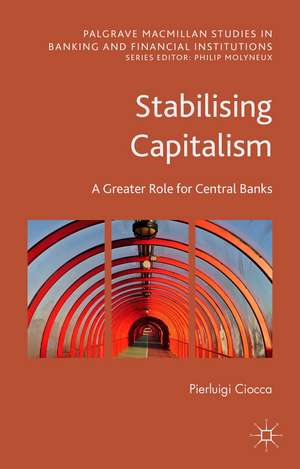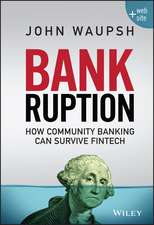Stabilising Capitalism: A Greater Role for Central Banks: Palgrave Macmillan Studies in Banking and Financial Institutions
Autor Pierluigi Cioccaen Limba Engleză Hardback – 21 oct 2015
Din seria Palgrave Macmillan Studies in Banking and Financial Institutions
- 9%
 Preț: 1028.24 lei
Preț: 1028.24 lei - 17%
 Preț: 359.43 lei
Preț: 359.43 lei - 9%
 Preț: 907.70 lei
Preț: 907.70 lei - 15%
 Preț: 694.04 lei
Preț: 694.04 lei - 15%
 Preț: 638.43 lei
Preț: 638.43 lei - 15%
 Preț: 643.34 lei
Preț: 643.34 lei -
 Preț: 389.11 lei
Preț: 389.11 lei - 15%
 Preț: 669.97 lei
Preț: 669.97 lei - 15%
 Preț: 642.51 lei
Preț: 642.51 lei - 15%
 Preț: 642.51 lei
Preț: 642.51 lei - 15%
 Preț: 649.06 lei
Preț: 649.06 lei - 15%
 Preț: 639.25 lei
Preț: 639.25 lei - 15%
 Preț: 640.06 lei
Preț: 640.06 lei - 18%
 Preț: 752.88 lei
Preț: 752.88 lei - 15%
 Preț: 640.06 lei
Preț: 640.06 lei - 15%
 Preț: 645.47 lei
Preț: 645.47 lei - 18%
 Preț: 889.75 lei
Preț: 889.75 lei - 15%
 Preț: 641.20 lei
Preț: 641.20 lei -
 Preț: 386.39 lei
Preț: 386.39 lei - 15%
 Preț: 643.34 lei
Preț: 643.34 lei -
 Preț: 388.72 lei
Preț: 388.72 lei -
 Preț: 396.40 lei
Preț: 396.40 lei - 15%
 Preț: 642.51 lei
Preț: 642.51 lei - 15%
 Preț: 638.76 lei
Preț: 638.76 lei - 15%
 Preț: 639.73 lei
Preț: 639.73 lei - 15%
 Preț: 637.59 lei
Preț: 637.59 lei -
 Preț: 387.75 lei
Preț: 387.75 lei - 15%
 Preț: 641.20 lei
Preț: 641.20 lei - 15%
 Preț: 640.88 lei
Preț: 640.88 lei -
 Preț: 389.70 lei
Preț: 389.70 lei - 15%
 Preț: 648.24 lei
Preț: 648.24 lei - 15%
 Preț: 638.43 lei
Preț: 638.43 lei - 15%
 Preț: 641.20 lei
Preț: 641.20 lei - 15%
 Preț: 638.76 lei
Preț: 638.76 lei -
 Preț: 391.61 lei
Preț: 391.61 lei - 15%
 Preț: 641.20 lei
Preț: 641.20 lei - 15%
 Preț: 643.34 lei
Preț: 643.34 lei - 15%
 Preț: 641.71 lei
Preț: 641.71 lei -
 Preț: 390.63 lei
Preț: 390.63 lei - 15%
 Preț: 641.71 lei
Preț: 641.71 lei - 15%
 Preț: 644.95 lei
Preț: 644.95 lei - 15%
 Preț: 645.79 lei
Preț: 645.79 lei - 15%
 Preț: 645.79 lei
Preț: 645.79 lei - 15%
 Preț: 638.76 lei
Preț: 638.76 lei - 15%
 Preț: 640.06 lei
Preț: 640.06 lei - 15%
 Preț: 640.06 lei
Preț: 640.06 lei - 15%
 Preț: 643.34 lei
Preț: 643.34 lei - 15%
 Preț: 642.51 lei
Preț: 642.51 lei - 15%
 Preț: 640.06 lei
Preț: 640.06 lei - 18%
 Preț: 1125.86 lei
Preț: 1125.86 lei
Preț: 382.36 lei
Nou
Puncte Express: 574
Preț estimativ în valută:
73.17€ • 76.58$ • 60.90£
73.17€ • 76.58$ • 60.90£
Carte tipărită la comandă
Livrare economică 31 martie-14 aprilie
Preluare comenzi: 021 569.72.76
Specificații
ISBN-13: 9781137555502
ISBN-10: 1137555505
Pagini: 105
Ilustrații: VIII, 105 p.
Dimensiuni: 140 x 216 x 8 mm
Greutate: 0.28 kg
Ediția:1st ed. 2016
Editura: Palgrave Macmillan UK
Colecția Palgrave Macmillan
Seria Palgrave Macmillan Studies in Banking and Financial Institutions
Locul publicării:London, United Kingdom
ISBN-10: 1137555505
Pagini: 105
Ilustrații: VIII, 105 p.
Dimensiuni: 140 x 216 x 8 mm
Greutate: 0.28 kg
Ediția:1st ed. 2016
Editura: Palgrave Macmillan UK
Colecția Palgrave Macmillan
Seria Palgrave Macmillan Studies in Banking and Financial Institutions
Locul publicării:London, United Kingdom
Cuprins
Preface
Acknowledgements
1. The roots of central banking
2. Tendencies
3. Rigour and flexibility
4. Discretion, not rules
5. The temporary re-emergence of rules
6. The crisis of 2008
7. Regulatory shortcomings, supervisory shortcomings
8. A return to central banking
9. Bagehot and beyond
10. Discretion, not arbitrariness
11. The protection of independence and discretion
12. Concluding remarks
Notes
References
Index of names
Acknowledgements
1. The roots of central banking
2. Tendencies
3. Rigour and flexibility
4. Discretion, not rules
5. The temporary re-emergence of rules
6. The crisis of 2008
7. Regulatory shortcomings, supervisory shortcomings
8. A return to central banking
9. Bagehot and beyond
10. Discretion, not arbitrariness
11. The protection of independence and discretion
12. Concluding remarks
Notes
References
Index of names
Recenzii
“It is an excellent, brief and crisp account of the main relevant issues. Seasoned central bankers and monetary economists, however familiar with the material, will find something new and stimulating, whether they always agree or not, and it is certainly to be recommended to less experienced ones who may still need to ‘learn from history’.” (John Chown, Central Banking Journal, February, 2016)
Notă biografică
Pierluigi Ciocca was head of market operations and economic research for the Bank of Italy and Deputy Director General of the Bank from 1995 to 2006. He is a member of Accademia dei Lincei and editor of the journal Rivista di Storia Economica, founded in 1936 by Luigi Einaudi.












